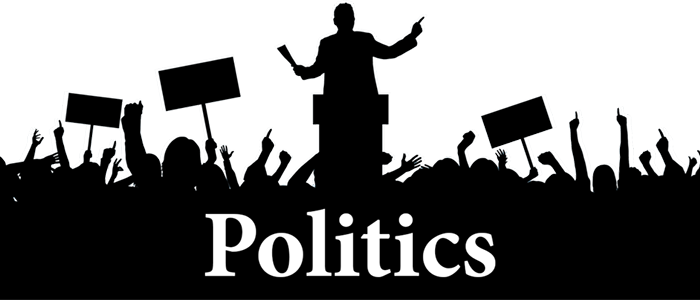Left, right or somewhere in the middle
A number of employees have recently raised questions about participating personally in issue-related advocacy or political activity. In light of these questions, we are circulating this guidance describing Smithsonian policies and federal law. There is a lot at stake as we head toward the presidential election. It’s important to be involved, but as a Smithsonian employee, you may be limited in the ways you contribute to the political discourse.

Current events are compelling and personal political activism is growing across the country. It is a good time to remember that as Smithsonian employees we may engage in political activities but only to the extent permitted by federal law and regulations.
The Hatch Act (5 U.S.C. §§ 7321-7326) and the U.S. Office of Personnel Management regulations (5 C.F.R. Parts 733 and 734) specifically govern the political activities in which federal civilian employees may and may not participate, and as a matter of policy, the Smithsonian applies these boundaries to its trust employees as well.
Smithsonian Directive 103, Section 10 (available at SD103.pdf) and the following notice outline the types of political activities in which SI employees generally can and cannot engage. “Political activities” for purposes of Smithsonian policy are: activities directed at the success or failure of a political party, candidate for partisan political office, or partisan political group.
If you have questions about specific political activities or would like to arrange a Political Activities Briefing for your unit, please contact the Office of the General Counsel at OGCEthics@si.edu.
If these activities occur outside the Smithsonian workplace and do not involve Smithsonian media or other Smithsonian resources,
Smithsonian Employees MAY
- Be candidates for public office in nonpartisan elections.
- Register and vote as they choose.
- Assist in voter registration drives.
- Contribute money to political campaigns, political parties, or partisan political groups.
- Attend political fundraising functions.
- Attend and be active at political rallies and meetings.
- Join and be an active member of political clubs or parties.
- Hold office in political clubs or parties.
- Sign and circulate nominating petitions.
- Campaign for or against referendum questions, constitutional amendments, or municipal ordinances.
- Campaign for or against candidates in partisan elections.
- Make campaign speeches for candidates in partisan elections.
- Distribute campaign literature in partisan elections.
- Volunteer to work on a partisan political campaign.
- Express opinions about candidates and issues. For example, a Smithsonian employee:
- MAY update his or her political party affiliation on personal social media profiles.
- MAY follow, “friend”, or “like” a political party, partisan political group, or partisan candidate.
- MAY post opinions about a partisan group or candidate.
- MAY display a political party or campaign logo or candidate photograph as his or her cover or header on social media profiles (but if so, the employee may not make any postings to that social media account while on duty or using official resources).
If employees are acting in any Smithsonian capacity, including performing a Smithsonian duty, occupying a Smithsonian workplace, wearing anything that identifies the Smithsonian or the employee’s position with the Smithsonian or using any Smithsonian computer, digital device, telephone, vehicle or other resource,
Smithsonian Employees MAY NOT
- Distribute political activity campaign materials or items.
- Display political activity campaign materials or items.
- Perform political activity campaign related chores.
- Wear or display partisan political buttons, t-shirts, signs or other items.
- Make contributions to a partisan political party, candidate for partisan political office, or partisan political group.
- Post a comment to a blog or a social media site that advocates for or against a partisan political party, candidate for partisan political office, or partisan political group.
- Post a comment or share any items on a social media site if the employee displays a political party or campaign logo or candidate photograph as his or her social media profile picture.
- Use an email account or social media to distribute, send or forward content to others that advocates for or against a partisan political party, candidate for partisan political office, or partisan political group.
Smithsonian Employees MAY NOT, AT ANY TIME, (whether in a personal or professional capacity)
- Use their official authority or influence to interfere with or affect the results of an election. For example, a Smithsonian employee:
- MAY NOT use their official titles or positions while engaged in political activity.
- MAY NOT invite subordinate employees to political events or otherwise suggest to subordinates that they attend political events or undertake any partisan political activity.
- MAY NOT direct statements on social media about a partisan political group to subordinate employees or a subset of individuals that includes subordinate employees.
- Solicit, accept, or receive a donation or contribution for a partisan political party, candidate for partisan political office, or partisan political group. For example, a Smithsonian employee:
- MAY NOT host a political fundraiser.
- MAY NOT invite others to a political fundraiser.
- MAY NOT collect contributions or sell tickets to political fundraising functions.
- MAY NOT forward, re‐post, or otherwise encourage others to make campaign contributions via social media.
- Be candidates for public office in partisan political elections.
- Knowingly solicit or discourage the participation in any political activity of anyone who has business pending before the Smithsonian.
Posted: 23 January 2024
-
Categories:
Administrative News , Education, Access & Outreach , Feature Stories , News & Announcements







